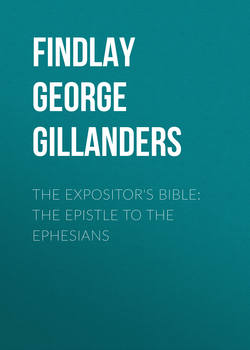The Expositor's Bible: The Epistle to the Ephesians

Реклама. ООО «ЛитРес», ИНН: 7719571260.
Оглавление
Findlay George Gillanders. The Expositor's Bible: The Epistle to the Ephesians
THE INTRODUCTION
CHAPTER I. THE WRITER AND READERS
PRAISE AND PRAYER
CHAPTER II. THE ETERNAL PURPOSE
CHAPTER III. THE BESTOWMENT OF GRACE
CHAPTER IV. THE FINAL REDEMPTION
CHAPTER V. FOR THE EYES OF THE HEART
THE DOCTRINE
CHAPTER VI. WHAT GOD WROUGHT IN THE CHRIST
CHAPTER VII. FROM DEATH TO LIFE
CHAPTER VIII. SAVED FOR AN END
CHAPTER IX. THE FAR AND NEAR
CHAPTER X. THE DOUBLE RECONCILIATION
CHAPTER XI. GOD’S TEMPLE IN HUMANITY
CHAPTER XII. THE SECRET OF THE AGES
CHAPTER XIII. EARTH TEACHING HEAVEN
PRAYER AND PRAISE
CHAPTER XIV. THE COMPREHENSION OF CHRIST
CHAPTER XV. KNOWING THE UNKNOWABLE
THE EXHORTATION
CHAPTER XVI. THE FUNDAMENTAL UNITIES
CHAPTER XVII. THE MEASURE OF THE GIFT OF CHRIST
CHAPTER XVIII. THE GROWTH OF THE CHURCH
ON CHRISTIAN MORALS
CHAPTER XIX. THE WALK OF THE GENTILES
CHAPTER XX. THE TWO HUMAN TYPES
CHAPTER XXI. DISCARDED VICES
CHAPTER XXII. DOCTRINE AND ETHICS
CHAPTER XXIII. THE CHILDREN OF THE LIGHT
CHAPTER XXIV. THE NEW WINE OF THE SPIRIT
ON FAMILY LIFE
CHAPTER XXV. CHRISTIAN MARRIAGE
CHAPTER XXVI. CHRIST AND HIS BRIDE
CHAPTER XXVII. THE CHRISTIAN HOUSEHOLD
ON THE APPROACHING CONFLICT
CHAPTER XXVIII. THE FOES OF THE CHURCH
CHAPTER XXIX. THE DIVINE PANOPLY
THE CONCLUSION
CHAPTER XXX. REQUEST: COMMENDATION: BENEDICTION
Отрывок из книги
In passing from the Galatian to the Ephesian epistle we are conscious of entering a different atmosphere. We leave the region of controversy for that of meditation. From the battle-field we step into the hush and stillness of the temple. Verses 3–14 of this chapter constitute the most sustained and perfect act of praise that is found in the apostle’s letters. It is as though a door were suddenly opened in heaven; it shuts behind us, and earthly tumult dies away. The contrast between these two writings, following each other in the established order of the epistles, is singular and in some ways extreme. They are, respectively, the most combative and peaceful, the most impassioned and unimpassioned, the most concrete and abstract, the most human and divine amongst the great apostle’s writings.
Yet there is a fundamental resemblance and identity of character. The two letters are not the expression of different minds, but of different phases of the same mind. In the Paul of Galatians the Paul of Ephesians is latent; the contemplative thinker, the devout mystic behind the ardent missionary and the masterly debater. Those critics who recognize the genuine apostle only in the four previous epistles and reject whatever does not conform strictly to their type, do not perceive how much is needed to make up a man like the apostle Paul. Without the inwardness, the brooding faculty, the power of abstract and metaphysical thinking displayed in the epistles of this group, he could never have wrought out the system of doctrine contained in those earlier writings, nor grasped the principles which he there applies with such vigour and effect. That so many serious and able scholars doubt, or even deny, St Paul’s authorship of this epistle on internal grounds and because of the contrast to which we have referred, is one of those phenomena which in future histories of religious thought will be quoted as the curiosities of a hypercritical age.2
.....
St Paul assures us that God and the world will be reunited, and that peace will reign through all realms and orders of existence. He does not, and he could not say that none will exclude themselves from the eternal kingdom. Making men free, God has made it possible for them to contradict Him, so long as they have any being. The apostle’s words have their note of warning, along with their boundless promise. There is no place in the future order of things for aught that is out of Christ. There is no standing-ground anywhere for the unclean and the unjust, for the irreconcilable rebel against God. “The Son of man shall send forth His angels, and they shall gather out of His kingdom all things that offend and them that do iniquity.”
When the apostle reaches the “heritage” conferred upon us in Christ (ver. 11), he is on the boundary between the present and the future. Into that future he now presses forward, gathering from it his crowning tribute “to the praise of God’s glory.” We shall find, however, that this heritage assumes a twofold character, as did the conception of the inheritance of the Lord in the Old Testament. If the saints have their heritage in Christ, partly possessed and partly to be possessed, God has likewise, and antecedently, His inheritance in them, of which He too has still to take full possession.47
.....